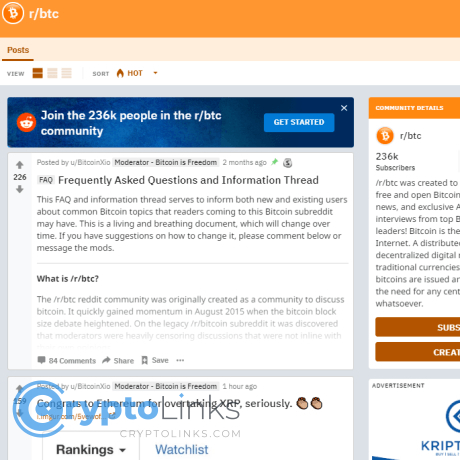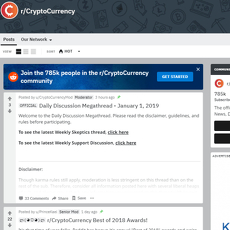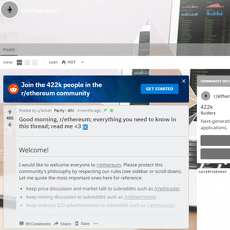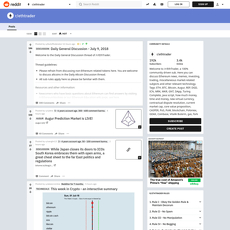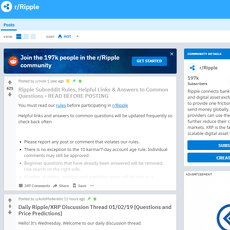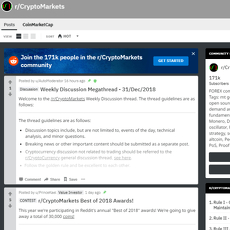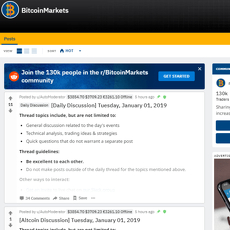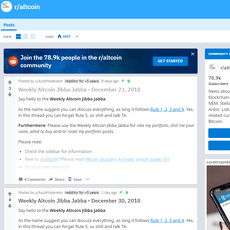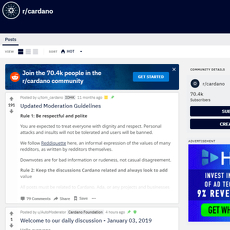r/btc Review
r/btc
www.reddit.com
r/btc Reddit Review Guide: What it is, how to use it, and the FAQs you actually care about
Thinking about checking out r/btc, but not sure if it’s worth your time? Are you wondering whether it’s signal, noise, or a bit of both—and how to actually make it useful for you?
Describe problems or pain
I see the same pattern over and over again: people click into r/btc expecting a carbon copy of r/Bitcoin, then get hit with a different culture, different rules, and a feed that swings from thoughtful tech threads to spicy price takes.
Here’s what trips most readers up:
- Mixing up the subs: r/btc is generally BCH-friendly and leans into open discussion. r/Bitcoin is stricter and BTC-Core aligned. If you don’t know that going in, you’ll read the room wrong.
- Signal-to-noise whiplash: Great adoption updates can sit next to “we’re going to the moon” posts. On pumpy days, memes and hot takes flood the feed.
- Conflicting claims: Fees, throughput, censorship—people argue from different assumptions. Without a quick way to check facts, you can get spun around fast.
- Low-effort hype: Screenshots with no sources, anonymous “insider” tips, and generic price spam. Easy to post. Hard to trust.
- Decision fatigue: You go in for five minutes and leave 45 minutes later with ten tabs open and no clear takeaway.
“BCH fees are basically zero—prove me wrong.”
—typical spark that starts a 200-comment thread full of charts, explorers, and strong opinions
The truth is, open communities are powerful but messy. Research on Reddit moderation shows that rule sets dramatically shape behavior—less restrictive spaces encourage participation and debate, but you’ll also see more variance in post quality. If you know how to filter, you can net real value without getting dragged into time-wasting arguments.
Want receipts? A few useful reads:
- Building Successful Online Communities (MIT Press) — why norms and tools matter more than slogans.
- “You Can’t Stay Here” (ACM) — how Reddit policy shifts change behavior at scale.
Promise solution
Here’s what I’ll do for you: give a straight, practical walkthrough that actually saves time. You’ll get a quick background on what r/btc is, how it differs from r/Bitcoin, the features that matter, and the exact filters and sanity checks I use when I want real information, fast. I’ll also point you to the kind of posts worth following—and the tells that scream “skip.”
Why this guide is different
- No tribal cheerleading: I care about useful outcomes—better sources, cleaner feeds, smarter questions.
- Action-first: I prioritize steps you can use in under 10 minutes. Less theory, more “click this, ignore that.”
- Context + guardrails: I’ll show you how to get the good stuff while avoiding common traps (hype, unverifiable claims, and DM “opportunities”).
Who this is for
- Curious lurkers: You want to see uncensored crypto discussions without wasting your afternoon.
- BCH-friendly readers: You’re fine with BCH talk and want to monitor adoption, fees, and tooling.
- Builders and merchants: You care about practical posts—payment setups, wallet UX, and real-world reports.
- Open-discussion fans: You prefer fewer moderation walls and you’re okay sorting through competing views.
Quick snapshot
Link: r/btc
- Reputation: Known for open moderation compared to r/Bitcoin; generally friendly to Bitcoin Cash (BCH).
- Content mix: Adoption stories, fee/throughput posts, dev updates, market chatter, and the occasional meme storm.
- What to expect: Strong opinions, fewer removals, and threads that reward fact-checking. Great when you want context; risky if you’re chasing tips.
So if the culture is different and the rules are different, what exactly makes r/btc its own thing—and why does that distinction matter when you’re looking for trustworthy information? Let’s answer that next.
What r/btc is (and how it differs from r/Bitcoin)
If you’ve ever asked a blunt question about fees, scaling, or forks and felt like you were talking to a wall, you’ll understand why this community exists. r/btc grew into a separate lane on Reddit for people who wanted fewer gatekeepers and more head-on debate about how Bitcoin should work in the real world. It’s not anti-Bitcoin; it’s pro-argument—and historically more welcoming to Bitcoin Cash (BCH) discussion than r/Bitcoin.
“Sunlight is the best disinfectant.” — Louis Brandeis
That quote captures the mood. r/btc leans toward the idea that messy, public debate beats quiet removals. r/Bitcoin, by contrast, is tightly curated for a BTC-Core-focused narrative, with strict rules that keep threads on a very specific track. Both styles have trade-offs; it depends on what you’re looking for.
Short history you should know
Let me keep this tight and useful. The backstory goes like this:
- 2015–2016: Friction over the block size limit and scaling plans heated up. Users felt certain discussions were being throttled or off-limits on r/Bitcoin. r/btc emerged as a separate space with an “uncensored” ethos.
- 2017: SegWit rolled out on BTC; competing visions for on-chain scaling culminated in the Bitcoin Cash hard fork on Aug 1, 2017. r/btc naturally became friendlier to BCH viewpoints and adoption updates, while still talking BTC and broader crypto.
- Aftermath: The split wasn’t just technical; it was cultural. r/btc kept the door open for arguments about fees, throughput, and merchant use—topics that were often less welcome elsewhere.
If you remember waiting hours for a confirmation during the 2017 congestion spikes, the appeal of big blocks and low fees won’t feel theoretical. r/btc was the place where people said that part out loud without getting shushed.
Culture, moderation, and stance
Here’s the vibe you’ll notice fast:
- Fewer removals, broader scope: Expect strong opinions, fiery threads, and room to challenge sacred cows. That doesn’t mean “anything goes”—spam, scams, and abuse still get removed—but the tolerance for heated disagreement is higher.
- BCH-friendly, not BCH-only: You’ll see BCH adoption stories, CashTokens progress, and wallet updates right next to critiques of BTC fees, Lightning UX, or exchange policies.
- Source-first culture (on good days): Good posts link to repos, block explorers, or primary docs. Low-effort hype gets called out, sometimes harshly.
There’s some research that helps frame why this matters. Academic work on Reddit communities has shown that heavy-handed bans and removals can push people to migrate and rebuild elsewhere rather than change their minds—you can move the talk, but you don’t erase it. See: Chandrasekharan et al., “You Can’t Stay Here: The Efficacy of Reddit’s 2015 Ban,” CHI 2017 (link). r/btc is basically the case study for that dynamic in crypto: when one room gets narrower, another opens across the hall.
Who feels at home here
- Builders and merchants who care about payments actually working—fast, cheap, and reliable. You’ll often see real-world updates like “new café accepts BCH” or regional merchant lists getting longer.
- Fee-sensitive users who send lots of small transactions and want to talk about practical trade-offs, not just theory.
- Open-discussion fans who prefer arguments in public to quiet moderation behind the scenes.
- Skeptics of central narratives—people who want to challenge default assumptions around BTC scaling, wallet custody, and network incentives.
Who might not
- BTC-only readers who want a strictly Core-aligned feed with minimal fork talk—r/Bitcoin will feel more comfortable.
- People allergic to debate—r/btc can get spicy. If heated threads drain you, a broader sub like r/CryptoCurrency might be easier to skim.
- Readers who want tight curation and fewer opinionated hot takes. Here, you’ll need to bring your own filters.
So if that’s the landscape, how do you make it work for you instead of getting yanked around by the loudest commenters? Want a quick setup that surfaces the signal in under 10 minutes—sorting, flairs, and a couple of search tricks I actually use? Keep reading; I’ll show you exactly how I set it up next.
How to get value from r/btc in 10 minutes
“In a noisy market, your attention is your edge.”
I treat r/btc like a radar. In 10 minutes, I want the strongest signals: credible news, real adoption, and builder updates. Here’s the setup I actually use, with quick links you can save.
Sorting, flairs, and filters that save time
Goal: surface high-signal posts and mute the filler.
- Start with “Top” to capture what the community already filtered for you:
- Top: Week — quick pulse of what mattered.
- Top: Month — bigger-picture shifts and key threads.
- Use post flairs to switch contexts fast. On the sub’s header, tap the Flair filter and pick:
- News for headlines with sources.
- Development for repos, PRs, and releases.
- Adoption for merchant stories and rollouts.
- AMA for direct Q&A with builders.
- Need extra signal during hype weeks?
- Use the flair pills to show only News/Development.
- On desktop, the free Reddit Enhancement Suite lets you hide posts by keywords (e.g., add a filter for [Meme] or “price to the moon”).
There’s a reason this works. Research from Nielsen Norman Group shows people scan online content and focus attention on obvious value; picking “Top: Week” and specific flairs reduces decision fatigue and cuts the scan time dramatically.
Smart search hacks
Goal: jump to the exact threads that matter.
- Fresh dev work: filter to GitHub links:
- site:github.com, sort=new — new commits, releases, and PRs as they’re posted.
- Try titles that signal action: title:release OR title:patch.
- AMAs and Q&As:
- title:AMA, sort=new — spot sessions early so you can ask questions.
- Real-time updates:
- fee OR mempool, sort=new — fee spikes, congestion chatter, and wallet tips.
- merchant OR adoption, sort=new — fresh store integrations and payment anecdotes.
- Pro tip: stack operators for precision:
- title:release site:github.com narrows to release posts linking to GitHub.
- title:proposal flair_name:Development focuses on technical proposals.
Save these searches in your browser bookmarks. Two clicks, and you’re in the good stuff.
Posting etiquette to avoid headaches
Goal: share value without tripping mod rules or getting ignored.
- Read the rules first. They’re brief, and they’ll save you time.
- No low-effort price spam. If you post charts, add timeframes, methods, and links. If you can’t explain it, don’t post it.
- Be crystal clear with claims. If you say “zero-fee” or “instant,” add proof: wallet link, explorer txid, or docs.
- Disclose relationships. If it’s your project, say so. The community is fine with promotion when it’s helpful and transparent.
Simple template that earns respect:
- What it is: one sentence.
- What’s new: 1–3 bullet points (release, integration, fix).
- Proof: GitHub/Docs/Explorer links.
- Your role: founder, contributor, user.
- Ask: “Looking for feedback on X. Happy to answer questions.”
That structure reduces friction (think Hick’s Law) and earns better engagement.
Follow AMAs and dev updates
Goal: get direct answers from builders and track progress.
- On desktop: keep two tabs pinned:
- AMA: sort=new
- Development: sort=new
- Ask questions early. Top questions get answered first. Be specific: wallet version, OS, steps to reproduce, or expected behavior.
- Skim the answers, save the links. Great AMAs often include roadmaps, security notes, and test builds.
Regional adoption posts
Goal: separate real-world signal from feel-good anecdotes.
- What to look for:
- Receipts, QR screenshots, or short videos showing a BCH payment in-store.
- Merchant details: city, store name, contact/website.
- Repeatability: multiple customers or follow-up comments from others.
- Sanity-check in seconds:
- Ask for a txid and verify on an explorer like Blockchair (BCH).
- Is the store listed on a map or directory? Does the owner confirm in comments?
- No rush, no DMs. Real adoption stories don’t push wallets, tokens, or “special offers.”
Ten-minute routine I use on busy days:
- Open Top: Week, scan headlines for News/Development.
- Run two saved searches: site:github.com (new) and title:AMA (new).
- Quick-check Adoption flair for any merchant posts with proof.
- Save 2–3 high-signal threads, follow those users, and close the tab.
Want to know exactly which post types on r/btc are worth your attention—and the red flags I ignore every time? Keep going; the next section breaks down the feed and shows you how to spot real signal fast. Which do you think wastes more time: meme price threads, or “urgent” screenshots with no sources?
What you’ll see on r/btc (and how to spot real signal)
Scroll r/btc for a week and you’ll see a pattern: solid news and adoption threads, spicy market chatter, and the occasional “get-rich-yesterday” bait. The trick is building a quick reflex for what’s real. I keep one eyebrow raised and a short checklist ready.
“Extraordinary claims require extraordinary evidence.”
— Carl Sagan
News, adoption, and tech threads
These can be the best part of your feed when they come with receipts. I look for links to code, explorers, or credible outlets before I trust any claim.
- Releases and upgrades: If someone posts about a new BCH feature, I want a GitHub release or technical page to match it. Example: CashTokens updates should line up with docs at cashtokens.org and real commits or PRs.
- Merchant adoption: “We onboarded X stores” is great—now show proof. Photos, a receipt with a BCH address, or a listing in directories like AcceptBitcoin.Cash. If a store lists a donation or payment address, I paste it into an explorer like Blockchair (BCH) or Bitcoin.com’s BCH explorer to see activity.
- Infra and tooling: Node stats, wallet changes, fee talk—always better with sources. A thread claiming “fees are X” should be consistent with recent blocks in an explorer and official release notes.
When a post nails the sources and adds context, I save it and follow the poster. High-signal contributors make the sub worth it. Tap “Follow” on profiles that consistently bring code links, data, or first-hand merchant stories.
Market talk and memes
Memes are great for catching mood; they’re not a trading plan. I treat market threads as sentiment snapshots and nothing more unless the author shows their work.
- Ask for method: “Based on what?” If someone shares a chart, I want the timeframe, indicators, and where the data comes from. No method = entertainment.
- Use it as a mood meter: Lots of euphoric memes? That’s your cue for crowd excitement—useful, but be careful with it.
- Remember the bias: Research shows social media sentiment and attention can correlate with short-term volatility, but that doesn’t mean it’s predictive for your wallet. See Kristoufek’s analysis of attention and Bitcoin price dynamics (PLOS ONE).
One more reason to keep your guard up: sensational and emotional content tends to spread faster than sober analysis. That’s not my opinion—it’s backed by a well-known Science study on how false news outpaces true news on social platforms (Vosoughi, Roy, Aral, 2018). Good reminder to breathe before you act.
Red flags and scam tells
If a post makes you feel rushed, chosen, or “in on something,” step back. The worst losses usually start with urgency and flattery.
- Guaranteed returns or fixed yields: “Risk-free 20% APY” belongs in fairy tales. We’ve seen how promised “stable” yields can unravel overnight.
- Brand-new accounts shilling: Zero history, sudden hype, and a link-littered post? Hard pass.
- Unverifiable screenshots: Wallet balances and “exclusive chats” that you can’t verify. Ask for transaction IDs or on-chain proof. No proof, no trust.
- DM pressure and fake support: “Message me to claim,” “Admin will help you recover funds,” or “Special whitelist.” Real teams don’t need your DMs to prove legitimacy.
- Address poisoning and impostors: Always check the first and last 6–8 characters of any address before you send. Lookalike addresses are a real thing.
This isn’t a niche problem. The U.S. Federal Trade Commission reported more than $1B lost to crypto scams since 2021 (FTC data). If a thread triggers FOMO, remember: there will always be another opportunity—but you only get one stack to protect.
How I verify claims fast (and keep my sanity)
Here’s the quick “trust, but verify” flow I run through when a post catches my eye:
- On-chain claims: Paste the TXID or address into Blockchair (BCH) or Bitcoin.com’s BCH explorer. Check:
- Time, confirmations, and amount match the story?
- Is the address new or seasoned? Does activity make sense?
- Tech updates and releases: Look for an official repo or site:
- Bitcoin Cash Node repo (commits, releases, contributors)
- CashTokens docs (specs, tooling, references)
If there’s no repo or the GitHub was created last week with one contributor, I mark it low-trust.
- Adoption posts: Cross-check the merchant:
- Listed on AcceptBitcoin.Cash or their official website?
- Do they share a BCH QR or address you can verify on-chain?
- Headlines and “breaking” news: Confirm with at least two credible sources or the primary source (company blog, repo, regulatory filing). Hot takes are fine—just separate them from facts.
- Creator credibility: Skim the poster’s history. Do they share sources, or just emotions? I save users who consistently post verifiable info and mute the rest.
Signal has a look: clear sources, consistent details, and a tone that doesn’t need to shout. Noise relies on urgency and vagueness. Once you see it, you can’t unsee it.
Real post patterns I “green-flag”
- “We shipped X; here’s the code + docs.” Post includes a GitHub release, a changelog, and a discussion thread. I’ll often bookmark and follow contributors from these.
- “We onboarded Y merchants; here are photos and addresses.” Bonus if the merchant confirms on their own social page.
- “Here’s a fee comparison with explorer links.” Shows block timestamps, vbytes/KB, and a sanity-checked fee estimate. No cherry-picking single blocks.
And if you’re ever unsure, ask for proof politely in the comments. Honest builders won’t mind; grifters hate specifics.
Want the exact setup I use to filter harder, stay private, and avoid the traps that catch most people? In the next part, I’ll share simple tools and habits that make all the difference—what’s your current “safety checklist” looking like?
Safety, tools, and alternatives that pair well with r/btc
Reddit can be a sharp tool or a blunt object—it depends on how you set it up. Here’s the stack I use to stay safe, cut misinformation fast, and pair r/btc with the right sources so I’m learning, not just scrolling.
Account security and privacy basics
Rule one: protect your login like it’s a wallet. The number of crypto-related account takeovers tied to weak passwords and SMS codes is still way too high. Microsoft reported that enabling multi‑factor authentication blocks 99.9% of automated account attacks—use it everywhere you can.
“Don’t trust—verify.” And never through DMs.
- Turn on 2FA (not SMS): In Reddit, go to User Settings → Safety & Privacy → Two-factor authentication. Use an authenticator app (Aegis, Authy, 1Password) or a hardware key (YubiKey).
- Unique, long passwords: A password manager beats memory every time. I use 1Password/Bitwarden with 20+ character random passphrases.
- Kill SIM‑swap risk: Add a carrier PIN and avoid SMS-based codes. The FBI’s 2022 Internet Crime Report flagged rising SIM-swap losses—don’t be the easy target.
- Use a throwaway for browsing: Separate “read-only” Reddit from any account tied to your real identity or funds.
- Privacy settings to flip now:
- Disable “show active status” and chat invites.
- Turn off personalized ads and data sharing.
- Use old.reddit.com for fewer scripts, or run uBlock Origin and a hardened browser profile.
- Never share keys or seeds: Not screenshots, not snippets, not “partial words.” No one legit needs them. Ever.
Sources worth a skim: Microsoft Security on MFA effectiveness, FBI IC3 2022 report.
Fighting misinformation
Reddit’s speed is a blessing and a curse. I use a quick “SIFT” routine (from Stanford’s Civic Online Reasoning research) to keep myself honest: Stop, Investigate the source, Find better coverage, Trace claims back to primary data.
- Build your “trust score” list: Save users who cite txids, repos, and official docs. Mute serial hype accounts.
- Cross-check headlines: If one outlet says “X is confirmed,” I look for a second source and the original announcement or code diff.
- Ask for receipts: For adoption posts, ask for merchant URLs, photos with QR codes, and (if appropriate) a small txid.
- Time matters: Many hot takes age like milk. Sort by Top (Week/Month) to see what survived first-pass scrutiny.
- Don’t act on single-source claims—especially with money: Screenshots can be fabricated, links can be spoofed, and “official” accounts get impersonated.
Pro tip: Practice lateral reading. Open three tabs: the claim, an independent outlet, and the primary source (GitHub, explorer, official blog). If tab three doesn’t exist, that’s your sign.
Complementary communities and sites
r/btc is great for open conversation. Pair it with sources that confirm facts and give you on-chain or primary data.
- Other subs:
- r/Bitcoin for BTC-core aligned updates.
- r/CryptoCurrency for broader market sentiment.
- Project‑specific subs for dev notes and release threads.
- Explorers and network health:
- Blockchair (BCH), Bitcoin.com BCH explorer
- mempool.space (BTC) for fees, mempool, and RBF flags
- Coin.Dance for BCH/BTC stats, nodes, and hash rate
- Docs and learning hubs:
- Bitcoin Cash Node docs, BitcoinCashResearch.org
- Kraken Learn, Coinbase Learn for neutral primers
- GitHub repos for releases and issues—always the best source for what actually shipped
- Price and fee checkers:
- Kraken Convert or your go‑to exchange quote
- mempool.space (BTC) for live fee estimates; BCH fees are typically low but confirm on Blockchair
Mini workflow: See a claim on r/btc → open the explorer or repo → confirm version, txid, or fee → only then share, trade, or save.
Responsible self-promotion
If you’re sharing your project, remember that trust is the currency here. Earn it in public.
- Lead with value: Start with the problem you’re solving, not the token.
- Show proof: Link the GitHub, docs, demos, and a txid for any “adoption” claim.
- Disclose your role: Founder? Dev? Marketer? Say it. Hidden affiliations get you flagged.
- Invite feedback: Ask for code review, threat models, or UX notes. Answer hard questions.
- No pressure tactics: No “DM me for whitelist.” Keep everything in the thread for transparency.
One more thing: emotion drives clicks, but receipts build reputations. When someone pings you privately with “urgent opportunities,” remember why scammers avoid public scrutiny.
Want the fastest way to check prices, spreads, and the “why is my fee so high?” questions everyone keeps asking? I’ll show you the exact tools and a couple of quick checks I use—ready to save yourself from hidden costs in the next section?
FAQ: Prices, fees, and r/btc specifics people ask me all the time
Quick answers you can use right now. None of this is financial advice—just practical guidance so you don’t get tripped up by fees, spreads, and Reddit noise.
How much is $1000 Bitcoin in US dollars today?
Use a live converter on a reputable exchange or wallet and check the quote right before you buy. That quote already bakes in two things most people forget:
- Spread (the difference between buy and sell prices)
- Platform fee (the app’s trading fee)
Quick example: If BTC is showing around $68,250 on a price index, a retail buy quote might be a bit higher—say $68,450—plus a visible fee. A $1,000 buy could land you roughly 0.0146 BTC before fees, and a touch less after. Always compare the mid-price you see on charts to the actual quote in your app; the gap is the spread you’re paying.
Pro tip: Quotes can shift by the second. If you’re placing a larger order, consider limit orders or breaking it into chunks to control slippage.
How much is a $1000 bitcoin transaction fee?
You’re looking at two different costs:
- On-chain network fee paid to miners. This fluctuates with congestion and your transaction size (in virtual bytes, vB).
- Platform fee charged by your app/exchange. This is separate and often a percentage of trade size.
Real-world ranges I’ve seen:
- Low congestion: 1–5 sat/vB can clear if you’re patient. A simple 150 vB spend at 3 sat/vB = 450 sats (0.00000450 BTC). At $68k/BTC, that’s ~$0.31.
- Busy periods: 50–150 sat/vB is common. That same 150 vB at 80 sat/vB = 12,000 sats (0.00012 BTC) ≈ $8.16.
- Peak spikes: 200–500+ sat/vB has happened during hype or major events (think NFT/Ordinal surges or halving weeks). 150 vB at 300 sat/vB = 45,000 sats (0.00045 BTC) ≈ $30.60.
Platform fees vary widely. Retail apps often sit around 0.5%–1.5% for smaller buys. On a $1,000 purchase, that’s $5–$15, on top of the network fee if you withdraw on-chain. Some services hide part of the fee in the spread, so read the fee breakdown screen carefully.
Why the big swings? Fee markets react to demand. Studies of mempool dynamics show that when blocks are full, users bid up fees quickly, and the backlog can take hours (or days) to normalize. If your timing is flexible, waiting can materially lower costs.
Ways to save: batch withdrawals, use SegWit addresses (bech32), consider Lightning for small payments, and pick slower confirmation targets when time isn’t critical.
How much is $100 Bitcoin worth right now in USD?
Get a live quote in your app and compare it to a neutral price index to see the spread. A quick mental check: if BTC is ~$68,250, then $100 is about 0.001465 BTC before fees. Expect tiny quote differences across platforms (often 0.1%–0.3%) and slightly wider spreads during weekends or volatile hours.
Is r/btc only about Bitcoin Cash (BCH)?
No. It’s BCH-friendly, but you’ll see broader crypto topics: scaling debates, merchant adoption posts, self-custody tips, and cross-chain market news. The thread quality ranges, so filter by flair and top posts if you want signal fast.
Are price posts allowed—and are they useful?
Yes, within the rules. Use them to gauge sentiment, not to form a trading plan. Research has consistently found that spikes in social attention (Reddit, Google Trends, X) often coincide with short-term volatility—great for a mood check, unreliable for long-term entries. If someone posts charts, ask for their method, timeframe, and risk rules. If they can’t explain, it’s entertainment, not analysis.
How do I avoid scams on r/btc?
- Don’t DM for deals, escrow, or “private opportunities.”
- Skip airdrop links, QR codes, and “double your crypto” pitches.
- Never share seed phrases or keys, ever.
- Look for verifiable proof: signed messages, on-chain txids, GitHub repos, official announcements.
- If they rush you, walk away. Real offers don’t need pressure.
Can I tip users?
Yes. People often share addresses or QR codes. Send small amounts only, confirm the address carefully, and remember: on-chain is irreversible. If you’re using BCH or BTC, the address formats differ (e.g., CashAddr vs bech32)—send the right coin to the right network.
Where do I report bad actors?
Use Reddit’s report tool and message the mods with links, screenshots, and a short description. If money moved, keep txids and timestamps. Depending on your region, you can also file a cybercrime report, but recovery is rare once funds are gone.
Useful resources I trust
I keep a running list here: {{longresources}}. You’ll find the price tools, explorers, learning hubs, and safety guides I actually use when I check claims or fees.
Trade safely
- Set your rules off Reddit (entry, exit, max risk per trade).
- Journal decisions and screenshots of quotes/fees.
- Use a cooldown: if you feel FOMO from a thread, wait 30–60 minutes before acting.
- Benchmark your quotes against a neutral index to spot high spreads.
Research flow
- Headline in a thread
- Find the primary source (official post, repo, status page)
- Verify on-chain or in docs if relevant
- Then read opinions and debates
Example: Someone claims “Fees are crazy today.” Check your wallet’s fee estimator and a public mempool dashboard, compare sat/vB across priority levels, then decide your timing. Facts first, opinions second.
Curious who actually gets the most value from r/btc and how to set it up so it works for you in minutes, not hours? I’ll show you exactly how I do it next.
My take: Should you join r/btc?
Short answer: yes—if you’re into open conversation, BCH-heavy perspectives, and real adoption stories. Just keep your skeptic hat on. The upside is clear: fewer moderation walls, more builder-to-user talk, and a stronger focus on payments than most crypto subs. The trade-off is noise and occasional tribal bickering. If you can filter, you’ll get value.
Two quick reality checks I always keep in mind when using Reddit for crypto:
- Upvotes can mislead. A Science journal experiment showed that a single early upvote can tilt perceptions and final scores. Popular doesn’t always mean accurate.
- Rumors travel fast. The MIT “false news” study found misinformation spreads quicker than truth on social platforms. Treat big claims like they’re guilty until proven innocent.
That said, r/btc has delivered plenty of “worth it” moments: grassroots merchant updates with receipts and QR flows, builders sharing roadmap notes and repos, and fee comparisons during busy on-chain periods that helped me sanity-check my own settings. When BTC fees spiked, threads discussing payment workarounds and wallet fee controls were surprisingly practical. On the BCH side, I’ve seen solid discussions around token standards and wallet feature rollouts—useful if you care about payments and low-cost transactions.
Who gets the most out of r/btc
- Builders who want blunt feedback and real testers. Post a demo and you’ll get UX critiques, fee math, and sometimes pull requests.
- Merchants experimenting with crypto payments. Expect tips on QR flows, point-of-sale setups, and gotchas like refund handling and staff training.
- BCH users tracking upgrades, wallet features, and adoption stories. It’s one of the few places where that conversation is primary, not an afterthought.
- Curious lurkers who value less-filtered debate. You’ll see arguments from multiple sides—useful for sharpening your own view.
- Cost-sensitive transactors who care about practical fees and reliability. You’ll often find timely notes on network conditions and payment strategies.
Day-one action plan
- Subscribe and set “Top: Week.” This trims a lot of noise and shows what the community found useful recently.
- Follow high-signal people. Save users who link primary sources (repos, explorers, official announcements) and provide clear evidence.
- Filter aggressively. Use flair filters to hide low-effort content. Keep News/Development/Adoption visible if you want signal.
- Run a 60-second verify. Before acting on anything: Is there a primary source? On-chain or official proof? Clear timeframe? Known risks?
- Adopt a “no-deals-in-DMs” rule. Public threads only, no seed phrases, no screenshots of wallets, no “urgent” anything.
- Set a timer. Five minutes in the morning, five at night. Reddit is a tool, not a boss fight.
Use Reddit for discovery and sentiment—not final decisions.
Final word
r/btc can be a time sink or a goldmine. If you want open conversation, BCH-leaning takes, and practical payments talk, it’s worth your sub. Treat upvotes as noise, verify anything important, and stick to your own plan. If you want me to check out another community or you’ve got a question you want answered, drop it here: cryptolinks.com. I’ll take a look.

